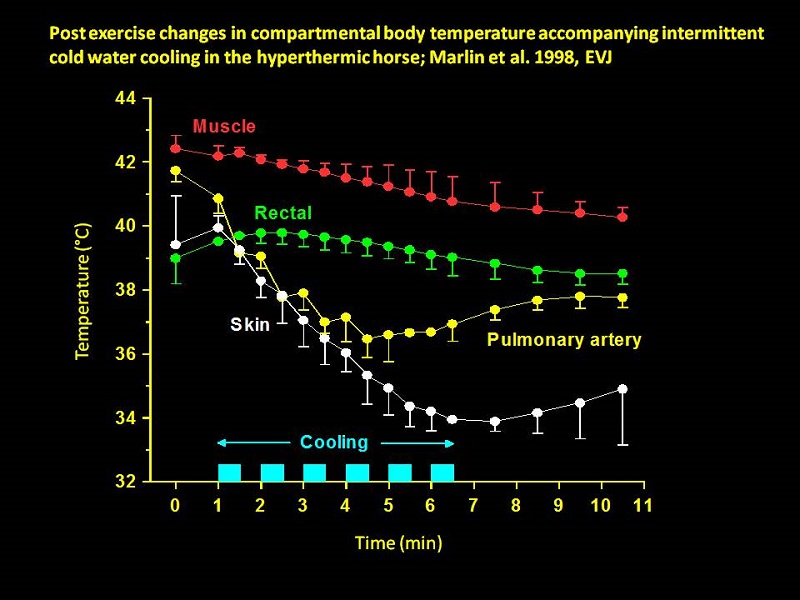Posted: 10th July 2018 | Back to news feed

ADVICE TO KEEP YOU AND YOUR HORSE SAFE IF YOU ARE TRAINING & COMPETING IN WARM OR HOT WEATHER
Dr David Marlin
Acclimatisation
If the weather suddenly becomes warmer, don’t attempt to try acclimatise your horse by exercising it in the hottest parts of the day if you are competing within a few days. When warm/hot weather appears suddenly, no horses will be acclimatised to training/competing in the heat. Acclimatisation takes 2-3 weeks of regularly exercising in the heat. If you start now your horse is likely to be worse by the weekend as in the first 3-5 days horses’ ability to deal with heat and exercise gets worse before they start to improve and competing could be a major health risk.
Travelling
If you are travelling with your horse in warm weather, leave very early or as late as possible, preferably after sunset. It’s not only that its cooler but the chance of hitting traffic is less. The worst thing for a horse is to be standing in a trailer or lorry that is stationary on hot roads at temperatures that may reach high 30°C’s….unless of course you have air-conditioning. Horses may lose 3-5kg per hour in warm weather and so could be considerably dehydrated after a 4-5h journey in the hotter parts of the day.
Competition
You must accept that your horse will not be able to do the same amount of exercise in the heat as it would in cooler weather. Your horse will produce more adrenaline in hot weather and use up muscle energy stores (glycogen) more quickly. Dehydration also increases adrenaline which compounds the problem. Therefore, if you compete just as hard as you would in cooler weather your horse will tire earlier. If you don’t compete as hard your speed will be slower but your horse will be at a lower risk of heat related illness.
Water
Your horse must have clean water at all times. Your horse may drink considerably more in hot weather. If you use buckets you should consider putting another bucket in the stable. Allow your horse water right up until the time you are going to take him to compete. You can also allow him to drink after warming-up and before competing. He will have a very strong urge to drink immediately after exercise and you should allow him to do so. There are many myths about water and exercise. Cold water does not cause problems. Large volumes of water do distend the stomach but that is also the mechanism by which the stomach knows to empty and allow the water through into the small intestine.
Electrolytes
If you have not been feeding electrolytes on a regular basis then do not try to suddenly load in large amounts (e.g. 100-200g). It will not replace any bodily deficits and it may cause feed refusal or gastro-intestinal upset. If you have not been feeding electrolytes regularly then start by feeding 50g of a balanced electrolyte split between at least two feeds. Do not be tempted to try and load the day before or the day of competition. If you are providing electrolytes at or during e.g. before or after competing or between rounds or phases (e.g. eventing, SJ, dressage) or during competition (e.g. endurance), then you can provide electrolytes in feed or in pastes or in water. If you provide electrolytes in water then your horses should have the option to drink plain water as well. You can offer the electrolyte water first and if this is refused offer then plain water. There is no difference in speed of uptake between electrolytes in water or dry electrolytes given in feed. If you provide electrolytes in water then aim for a ratio of around 5-6g electrolyte for every litre of water. In studies the acceptance decreases as the ratio increases above this (i.e. more horses will refuse if given water with 9-10g electrolyte per litre of water).
Warming-up
Horses need less time for soft tissues (muscle, tendon, ligament, etc) to “warm-up” in hot weather. You should aim to reduce the time you spend warming-up by around 50%. After warming-up you should try to find shade to stand in and you can cool your horse with water and ice (if available). Reducing your horses’ body temperature does not counteract the other physiological effects of warming-up. There is also no reason why you cannot go into competition with a horse that has been “wetted”. Covering the horse with water means that the horse evaporates this rather than has to use his own sweat.
Cooling
The most effective way to cool a horse is with cold water all over the body surface, especially in front of and behind the saddle if you are riding and being given water containers to pour on or all over if you are not riding and the tack is removed. The water really needs to be 15°C or less. Warm water is not any good for cooling down horses except by evaporation and this is much less efficient when horses are not exercising. If ice is availalbe, then use it to cool down the water. Water that is around 5°C is ideal and very effective at cooling. It does not cause constriction of blood vessels and prevent the horse cooling down – this is a myth. You should not concentrate on large veins or arteries or large muscle groups (another myth) and in fact this will be much less effective. You do not need to scrape off water – another myth! If its sits there it will evaporate and contribute to cooling the horse. It doesn’t matter how you get it on – buckets and hoses best; sponges ok. Cold water does not cause muscle cramps or tying-up.
This is the only study I am aware of that shows NOT SCRAPING does NOT cause skin temperature to rise! Blue blocks show period of iced-water application. Periods in between represent no water application and NO SCRAPING. Skin temperature and all other body temperatures still fall even though there is NO SCRAPING!

Rugs and Clothing
If you do put on a sheet then make sure it’s a white one. White material reflects some heat whilst dark colours absorb radiant heat. The same goes for your own clothing. If possible ride in white and wear a white helmet.
Heat-stroke / Heat-exhaustion
Signs that your horse may be suffering from the heat include:
Lethargy
Panting (faster shallow breathing)
Nostril flaring
Increased rectal temperature
Decreased appetite and thirst
Dark urine
Reduced urination
Reduced performance
Dark mucous membranes
Muscle spasms
“Thumps” (synchronous diaphragmatic flutter)
Abnormal (irregular) heart rhythm
Slow recovery after exercise
This is often referred to as heat exhaustion but if not managed properly and quickly can progress to heat stroke. This may include ataxia (being unsteady on the feet) and or collapse.
If your horse does go down then continue to cool-it aggressively and send for a vet!
IF YOU ARE CONCERNED THAT YOUR HORSE MAY HAVE SEVERE HEAT STROKE THEN IT’S IMPORTANT THAT YOU SEEK VETERINARY ADVICE AS SOON AS POSSIBLE.
Severe heat stroke/heat exhaustion can lead to renal failure, myopathy (muscle damage), laminitis, liver failure and can be fatal if not treated promptly. If you think your horse may be suffering heat related illness, move your horse into the shade and start to cool by pouring large amounts of water all over the body. If a hose is available then use that. If ice is available then use that to cool the water. Do not worry about scraping the water off, just apply more water. If your horse has developed heat exhaustion/heat stroke you may need to cool continuously for 10-15 minutes before you start to see an effect. You are extremely unlikely to do any harm and your horse is at much greater risk from not being cooled. If shade is available nearby and the horse is steady on its feet then move into the shade whilst continuing to cool.
Further Reading:
The Equestrian Index newsfeed is compiled from articles submitted by advertising members and expresses the opinions of those members. Watsons Directories Ltd shall not be held liable for any inaccuracies or mis-statements therein.
